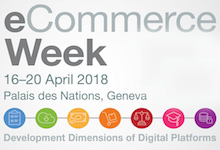Enabling e-commerce: Opening the door for SMEs
19 Apr 2018 10:00h - 11:30h
Event report
[Read more session reports from the UNCTAD E-Commerce Week 2018]
This session addressed how to enable e-commerce through public-private dialogue and explored specific e-commerce and e-payment challenges and priorities. Moderator Mr Sean Doherty (Head of International Trade and Investment System Initiative, World Economic Forum (WEF)), introduced the interactive format of the session, which would be organised around break-out group discussions with the participants in the room.
Introducing the topic, Mr Victor do Prado (Director of the Council and TNC Division of the World Trade Organization (WTO)) explained that, for a long time, international trade was relatively easy to understand for the WTO: there was clarity on what was sold, to whom, and how, and rules were comparatively easy to apply. The advent of e-commerce has added complexity in answering these questions and properly classifying the services that are enabled by the digital economy. Yet, this clarity is needed to create the necessary environment for small and medium enterprises (SMEs) to thrive. To capture the new world of e-commerce, there is a need to move away from thinking in siloes.
Mr Brian Wong (Vice-President of Global Initiatives of the Alibaba Group) highlighted the potential for e-commerce to create a more inclusive economy, provided that it is utilised in the right way: ‘how to make sure this transformation includes everyone?’. Wong shared his experience with Alibaba in building online marketplaces, and the benefits for developing countries to leapfrog traditional systems by building their own local platforms and online services that will enable SMEs to seize the opportunities provided by e-commerce. He also emphasised the importance of sharing best practices – as well as mistakes – and of providing capacity building opportunities not only to SMEs, but also to governments, to be able to understand how to nurture developments in the digital economy.
Ms Kimberly Botwright (Policy Analyst in International Trade & Investment, and Global Leadership Fellow at the WEF) presented the Enabling E-commerce project, which was launched by the WTO, WEF, and the Electronic World Trade Platform during the Eleventh Ministerial Conference of the WTO. The project is meant to drive public-private dialogue to develop policies and practices to benefit companies in e-commerce. WEF is issuing a series of scoping papers to provide a baseline of knowledge for these public-private discussions. In each region, public-private dialogues would identify the main challenges and relevant public-private initiatives to make sure that SMEs can thrive.
The participants were then divided into different groups, each guided by a discussion leader, to discuss the main challenges for SMEs in cross-border e-commerce, as well as the potential role of public-private collaboration. Discussion leaders then reported back on the outcomes of the discussions. Ms Rupa Ganguli (Founder and CEO of Inclusive Trade Ltd) highlighted the challenges of trust – not only by consumers towards the platforms they engage with, but also between stakeholders to cooperate and share information – as well as meaningful communication across sectors, and the need for clarity on trade rules. Mr Steven Pope (Vice President of Customs & Regulatory Affairs of the Deutsche Post DHL Group, emphasised the lack of coherence within governments, as well as in their understanding of the impact of e-commerce. Mr Gerry Mattios (Expert Vice President of Bain & Company) focused on the need for quality standards in developing countries, and the importance of assisting SMEs in understanding and reaching such standards. In addition, he underscored the necessity of trust, from a security perspective, but also related to the regulatory environment, enabling SMEs to address potential disputes that arise in e-commerce. Mr Alastair Tempest (CEO of the Ecommerce Forum Africa) added the need to address the challenge of fragmented ministries, which are still structured in a rather ‘old-fashioned way’, as well as the problems faced by rural areas, and the potential of postal operators to help SMEs to get off the ground. He furthermore noted the need to hear the voice of the SMEs themselves, especially considering the difficulty of having them included in decision-making bodies and conferences, as they usually lack the means for effective engagement.
In his final remarks, Do Prado explained that not all of the issues identified in the discussion during the session are high on the agenda of the WTO, and that this discrepancy is interesting to explore in further detail. While a lot of these challenges need to be solved through domestic governance, the borderless nature of e-commerce does create the need for coherence in the way in which the challenges are met by different governments, and the WTO can help identify the principles to address these challenges.
Wong highlighted that there is much more dialogue needed on this topic, since – due to the distributed and de-centralised nature of e-commerce – ‘everyone plays a role’. Governments are critical in creating fertile ground for businesses to flourish, while businesses are key to creating local platforms and addressing market issues. It will also be important to create networks between local platforms to tap into global demand. Botwright concluded by encouraging the participants to think about the synergies between the solutions and to pull them together to create a greater impact.
By Barbara Rosen Jacobson
Related topics
Related event

